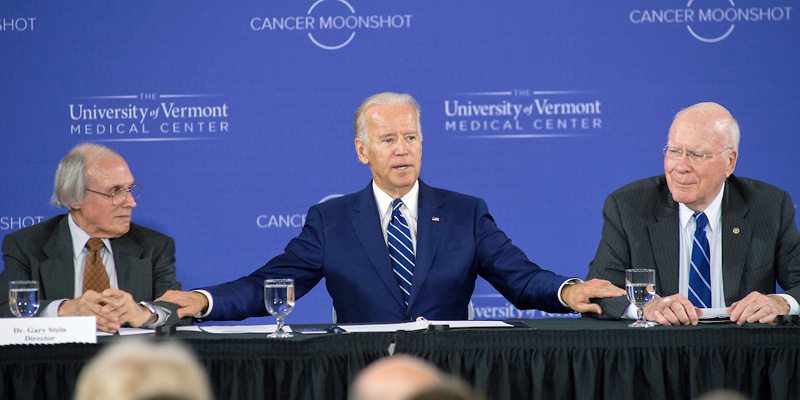“If you are ever going to be involved in cancer research, this is the moment,” Vice President Joe Biden told a packed Davis Center ballroom at the University of Vermont Oct. 21. “This is the inflection point.”

Sen. Leahy (right) invited Vice President Joe Biden to campus to speak about the 'Cancer Moonshot' initiative. The UVM Cancer Center, directed by Gary Stein (left), is home to ground-breaking work on precision cancer treatment. (Photo: Sally McCay)
“If you are ever going to be involved in cancer research, this is the moment,” Vice President Joe Biden told a packed Davis Center ballroom at the University of Vermont Oct. 21. “This is the inflection point.”
Just this week, Biden presented to President Obama the recommendations developed by the “Cancer Moonshot” task force. In January, the president put Biden at the helm of the $1 billion national initiative, which aims to rapidly accelerate the pace of development of effective cancer prevention, diagnosis and treatment strategies. The initiative's goal is to double the rate of progress by achieving a decade’s worth of advances in five years.
It’s a personal battle for Biden, who lost his son Beau to glioblastoma last year. His passion to find a cure was evident in his comments to the audience, comprising primarily of members of the UVM and UVM Health Network community, as he discussed all he’s learned from leading the initiative.
“What I’ve found out is the incredible diversity of disciplines that are needed to ultimately get to the bottom of what causes a mutant gene to become mutant — what causes it to become cancer,” he said.
A collaborative approach is a hallmark of the Cancer Moonshot initiative, which promotes open sharing of information as well as leveraging of resources from across the private sector (like IBM’s Watson) and government agencies not previously linked to the cancer fight.
On that point, Biden asked, “What’s the one place in the world that knows more about radiation that affects the human body than any place in the world? NASA. Not the Department of Health. That’s what they spend 70 percent of their time worrying about — how to protect astronauts from radiation exposure.”
When Biden concluded his remarks, co-panelist Gary Stein, director of the UVM Cancer Center, remarked that Biden’s vision “resonates incredibly well with the culture in Vermont, what the university does, and what the Vermont Cancer Center does, because here what you have is an emphasis on communication and collaboration.” The focus at UVM and in Vermont, he said, is on creating “a partnership between a clinician, a scientist and a patient.”
Sen. Leahy invited Biden to UVM because research labs at the university and the UVM Medical Center are on the frontier of new therapies such as precision cancer treatment and using genome mapping to treat patients.
Dr. Debra Leonard, a leading expert in molecular pathology for genetics, cancers and infectious diseases and chair of the Department of Pathology and Laboratory Medicine, also participated in the discussion.
“What’s amazing here in Vermont is that we have the opportunity to change how we’re caring for cancer,” she said. “I basically came here because I could be at the intersection of healthcare reform and genomic medicine.”
Also on the panel: Gov. Peter Shumlin; Rep. Peter Welch; Vermont Commissioner of Health Harry Chen; Sarah Lemnah, executive director of the Cancer Patient Support Foundation; Kimberly Luebbers, assistant dean for Clinical Research Administration; Suzanne Audy, Stage IV ovarian cancer survivor; and Kerri Frenya, with Ladies First, a program that helps women get breast, cervical and hearth health screenings.